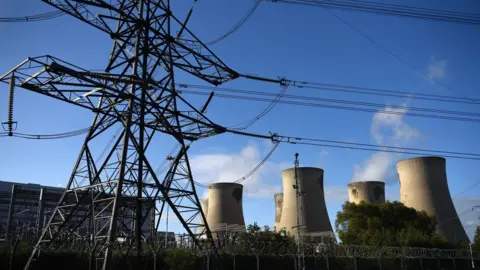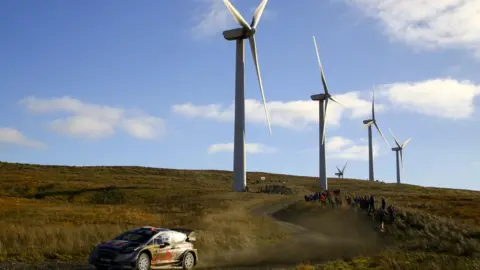Britain powers on without coal for three days
 Getty Images
Getty ImagesBritain has not generated electricity from coal for more than three days - the longest streak since the 1880s.
The new record comes just days after the last record of 55 hours was set, National Grid said.
The coal-free period began on Saturday at 1000 BST and has continued into Tuesday afternoon.
Power generated from wind and gas dominated the mix of energy for users in England, Scotland and Wales.
Just last week the UK grid recorded its first two-day period without using any power from the fossil fuel, which the government has pledged to phase out by 2025.
Coal accounted for less than 7% of the power mix last year, according to official figures.
In April, 2017 Britain went its first full day without coal since the 19th century.
 Getty Images
Getty ImagesHowever, experts warned that power generated by coal was largely being replaced by gas, another fossil fuel, rather than renewable sources.
Andrew Crossland, of the Durham Energy Institute, said gas generated 40% of the UK's electricity and fuelled the vast majority of domestic heating: "As a country we consume nearly eight times more gas than coal."
The daily consumption of gas was outstripped by wind on just two days last year, while all sources of renewable energy - including wind, solar, biomass and hydropower - beat fossil fuels for just 23 days of 2017.
A reliance on gas made the UK vulnerable to the whims of international markets and was "nowhere near clean enough" to meet the UK's legal targets to cut greenhouse gas emissions, Mr Crossland said.
The 2008 Climate Change Act requires greenhouse gas emissions to be reduced by 80% compared with 1990 levels by 2050.
Hannah Martin, from Greenpeace UK, called on the government to provide more support for onshore wind and solar power - the "cleanest and cheapest energy sources".
"Offshore wind has proven to be popular and able to provide affordable clean energy, as well as skilled jobs and fair bills," she said.
"As we have more and more days without coal, we need to make sure it is replaced with the renewable technologies of the future."
Mr Crossland also called for more investment in renewable technologies, such as solar panels and batteries, to store power for homes and businesses, along with better energy efficiency to reduce power use.
